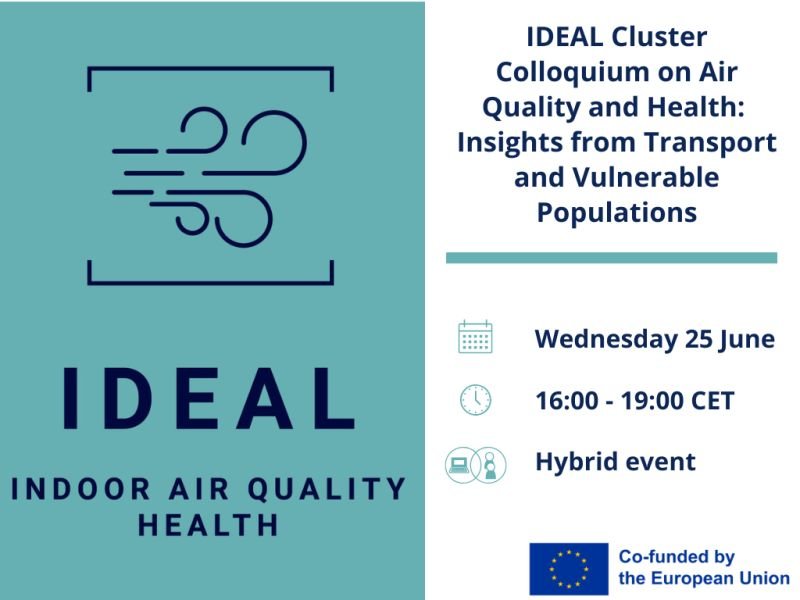
Duration: 2 hours and 15 minutes
When: 25th June 2025
Location: Auditori Esteve at Centre Esther Koplovitch (IDIBAPS main building): Carrer del Rosselló, 149, 08036 Barcelona. https://g.co/kgs/GUewZ5k
Format: Structured colloquium with two thematic blocks, followed by a joint discussion.
Working language: English
Register here.
This colloquium brings together several European research projects working on air quality (IAQ) and health to share insights, challenges, and complementary approaches.
The session will begin by highlighting final results from two key projects – AeroSolfd and VERA – that, while not part of the IDEAL cluster, offer valuable insights into the evaluation of and exposure to particulate matter (PM) in subway environments. While the full results of AeroSolfd will be presented during its final event on June 26, this colloquium will feature a short preview.
We will then explore further methodologies and protocols used by other ongoing IDEAL cluster projects to monitor and characterize air quality, expanding the scope beyond PM to include broader pollutants and exposure contexts — particularly in transportation settings and public infrastructure.
Finally, the session will close with a discussion on methods for evaluating health impacts, with a focus on vulnerable groups such as high-risk respiratory outpatients and children, where integrated strategies involving sensors, health indicators, and study design come into play.
The event aims to stimulate dialogue across projects and foster synergies, especially around methodological harmonization, PM characterization, and the intersection between IAQ and health.
Focus: Methodological approaches to monitor IAQ and assess its health impact in children and patients.
16:10-16:25. K-HEALTHinAIR Project – Indoor air quality and health in outpatient populations. Dr. Rubèn González (K-HealthInAir)
16:25-16:40. InChildHealth Project – Exposure assessment methodologies for children. María Antonia Aretaki (InChildHealth)
Focus: Final results from metro environments and ongoing methodologies for air quality monitoring in transport and public spaces.
Presentations:
16:40-17:00. AeroSolfd & VERA Projects – Exposure and airflow modelling in underground transport. Dr. Martin Lehmann (AEROSOLFD coordinator)
17:00-17:15. TWINAIR Project – Monitoring methodologies in public transportation. Antonis Papamanolis (TWINAIR)
17:15-17:30. EDIAQI Project – Experimental design for IAQ monitoring in hybrid public settings. María Esperanza Sánchez Muñoz (EDIAQI)
17:30-17:45. K-HEALTHinAIR Project – Monitoring methodologies in public spaces (metro station, market and hospital). Jose Fermoso (K-HEALTHinAIR coordinator).
Moderated discussion with contributions from all presenters.
Key guiding questions:
Open networking session with all participants.
Coffee, tea, and light snacks will be available in the auditorium hall to encourage informal exchange of ideas and experiences.
The meeting will take at the Esteve Auditorium, which is located within the IDIBAPS main building, the Centre Esther Koplovitch (see image below), at:
The venue is easily accessible on foot from the city centre, while the most convenient option (cheap and fast) for those staying in hotels located in peripherical neighbourhoods is the metro. The Hospital Clínic metro station (blue line, L5) is situated directly in front of the IDIBAPS main entrance, less than one minute away from the venue.